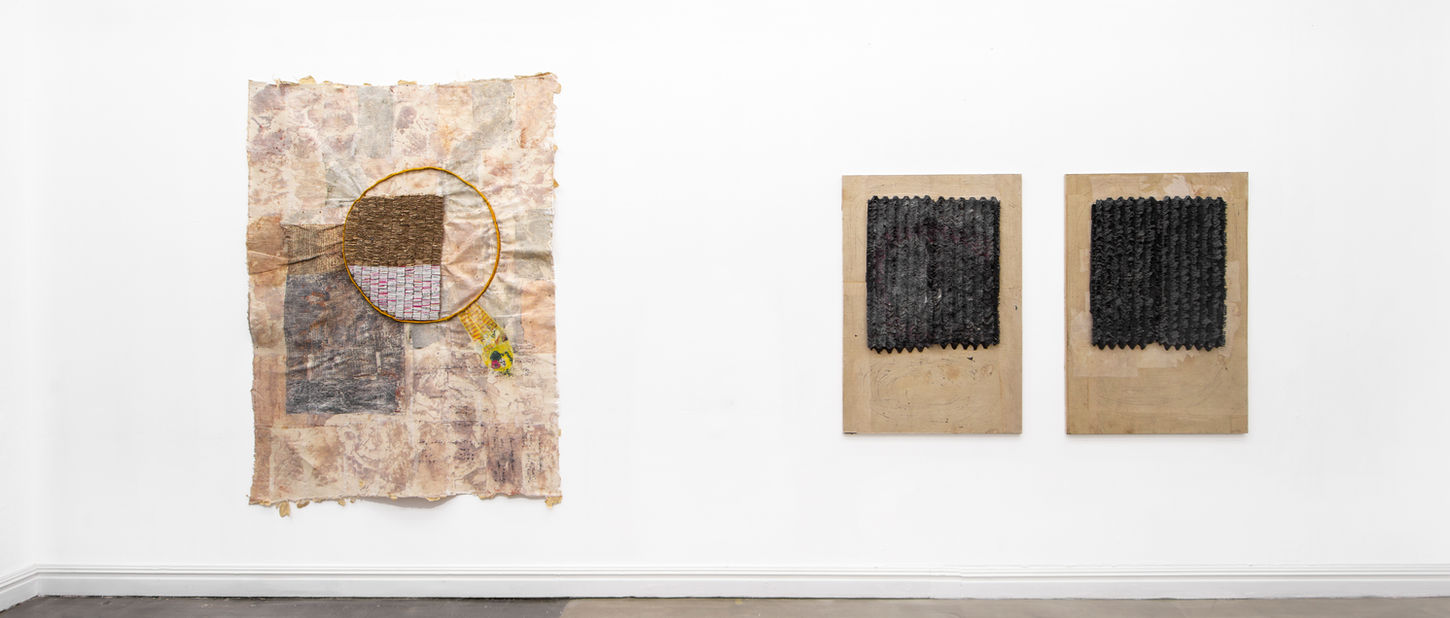top of page
Art Basel OVR: Miami Beach | 2020
WALLEN MAPONDERA
02.12.20 - 06.12.20
Zai Rakawora is a constellation of new works that centre abjection as a framework to imagine renewal and possibilities. These works are a significant mark in Mapondera’s practice and his journey to develop a radical abstract language using found objects. In Shona, Mapondera’s mother tongue, Zai Rakawora is an indictment - it refers to rotten eggs. It speaks to those moments when society relegates material and subjects to the realm of ‘useless’, when the value of things plummet.
Found objects are central to Mapondera’s practice. The inanimate things that he connects with are often those on their way out; used cardboard boxes, torn tarpaulin tents, egg trays, discarded boards. Mapondera ‘intervenes’ when their material, social and psychological power has shifted towards abjection. His interest is in the impermanent nature of the meaning and value of materials, their transitory nature and the forms they can mutate into via cause and effect. In his second year at the National Gallery School of Visual Arts and Design, the art college run by the National Gallery of Zimbabwe in Harare, Mapondera “witnessed groups of armed riot police guarding people who were driving mechanised graders that were demolishing houses and shacks, said to have been built without following the city council by-laws.”[1] This was the Zimbabwean Government’s 2004 “Operation Murambatsvina” (Operation Restore Order), which was described as a mechanism “to restore order to urbanisation”[2] by demolishing “illegal structures”. Criticised as a form of ‘politics by other means’, for Mapondera responding to these contentious discarded materials became the impetus for his creative practice.
‘Packaging’ is the key to Mapondera’s visual language. It is rooted in his observations of the inventiveness and creativity of everyday people as they stack their enterprises in contests for space, visibility and the right to the city. In turn, he upends packaging into a visual vocabulary that uses abstraction to transform found objects into exquisite artworks. With great technical mastery and organisation of materials, Mapondera transcends his chosen material’s original function and context and ‘packages’ them to bear witness with questions of truth, and how products, narratives and ideologies are ‘put together’ and transmitted. As Mapondera phrases it, “I will deliberately try to ‘empty’ it of its deceiving information written on the outside of food packaging. For me, this is a reflection on the fake promises made by different individuals and entities like political parties and churches as a way to lure followers”
Beyond packaging, Zai Rakawora is an exploration of abstraction. Mapondera’s process involves cutting, folding, twisting, sewing and bonding pieces of cardboard to a surface or one on top of another to transform discarded material into diverse forms, patterns, geometric shapes and gestural marks for effect. These ‘interventions’ on found material often manifest into a dialogue between his conscious mark and the unconscious ‘energy’ and memory stored in found objects. Emerging in works such as in Mbeu (the seed) I & II (2020) or Nhodzerwa I & II (2020) are expressive soliloquies which embody the artist’s psyche. He speaks of his process as a ritualistic act - “there are a lot of repeated processes when constructing my artworks, these repetitive acts are tiring and severe but the outcome is fulfilling” - invoking a cathartic element of his practice.
Other works like Zai Rakawora I & II (2020) allude to the tension between the personal and the collective as well as moral dimensions. The skin-like coverings of these works insinuates the abject, questioning boundaries and things that transgress order. Abstracted and sometimes stripped of clearly discernible subject matter, Mapondera’s art intrigues in its ability to draw expression from the texture of raw and rudimentary material like egg trays without being anti-beauty. His mastery of material breathes new life into the discarded things he collects. They take new form, meaning and mutate into visual poetry, a contradiction to their previous form as rigid functional products. In Nhodzerwa I & II (2020) and Ronga Dondo I & II (2020), egg trays are layered and stacked in orderly formations that are both tantalising and menacing in their uniformity, intensity and apparent unity of purpose. They have a pulling effect, like a force field of restrained energy. Yet they also appear precarious, delicate and fragile. As cultural artefacts, they delight. They transform and transfix. They carry a multiplicity of readings, inscriptions of contexts, memory, nostalgia and power relations.
Zai Rakawora is an exploration of abstraction as well as a resistance, a counter-hegemonic extension of the shelf-life of products and material. Mapondera transforms and re-purposes ‘trash’ into cultural artefacts that critique, question, hope, dream and imagine. The things society throws away are given a life-line and agency to ‘speak back.’ Zai Rakawora asks pertinent philosophical questions about the functionality of objects and subjects in contemporary society at large.
Text by Tigere Mavura
[1] United Nations, 2005. Press Conference By Special Envoy on Human Settlements Issues in Zimbabwe, 22 July 2005. See https://www.un.org/press/en/2005/tibaijukapc050722.doc.htm
[2] United Nations, 2005. Press Conference By Special Envoy on Human Settlements Issues in Zimbabwe, 22 July 2005. See https://www.un.org/press/en/2005/tibaijukapc050722.doc.htm
02.12.20 - 06.12.20
Digital Edition

VISIT
bottom of page






















